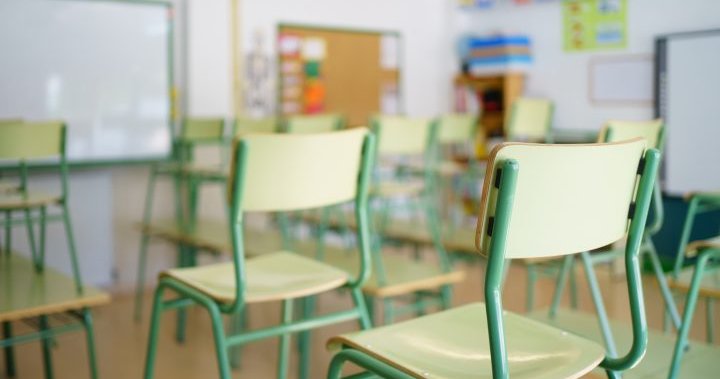Canada’s minister for women, gender equality and youth says policies in Saskatchewan and New Brunswick that require parental consent before students under 16 can have schools use their preferred pronouns and names puts transgender and nonbinary kids in a “life-or-death situation.”
And while Marci Ien declined to comment on whether Ottawa sees a role for itself in any potential court challenges, the cabinet minister said the Liberal government is keeping an eye on what unfolds.
“What I can tell you is that we’re watching closely as this develops,” she told The Canadian Press in an interview Wednesday.
“Obviously anything is possible, but I’m not going to comment on anything hypothetical at this time.”
Saskatchewan recently became the second jurisdiction to change its policy around pronoun use and name changes for students younger than 16, making it a rule that teachers must first seek permission from those students’ parents. The provincial government says the change originated out of concerns from parents and a desire to apply one uniform policy across all school divisions.
Premier Scott Moe signalled plans to make the change ahead of the coming school year, after the topic of parental consent over issues of sexual health, orientation and gender identity was in the summer spotlight.

The Saskatchewan government suspended Planned Parenthood from giving sexual health presentations in schools this spring after a Grade 9 student in Lumsden, north of Regina, took home a pamphlet containing graphic, sexual words. Planned Parenthood says the brochure, intended for older audiences, had been grabbed from a side table, where it had been inadvertently been mixed with other materials.
An August byelection in the riding where the high school is located saw the Saskatchewan United Party, a fledgling right-of-centre party, eat into the governing Saskatchewan Party’s rock-solid rural vote after campaigning on the issue of “parental rights.”
The changes to school policy in the province also means a pause on third-party organizations providing sexual education at schools.
In June, New Brunswick Premier Blaine Higgs became the first provincial leader to wade into the issue of parental consent, which has gained increasing traction among social conservatives.
That province previously had a policy that made it mandatory for teachers to use a student’s preferred pronouns and names. They are now required to have parental consent to do so for students under 16.
The Progressive Conservative government clarified some aspects of the policy after a scathing report from the province’s child and youth advocate warned the changes risk violating children’s rights under the Charter of Rights and Freedoms.
Now, psychologists, social workers and other school professionals will be permitted to use the preferred names and pronouns of students under 16 without parental consent. But it has doubled down on the central elements of its policy.

The concern over the rights of children is shared by a prominent national civil liberties group, which believes the policies ought to be challenged.
“These policies have a discriminatory impact on trans and gender-diverse students,” said Harini Sivalingam, director of equality programs at the Canadian Civil Liberties Association
“For example, a cisgender student who wants to use a nickname doesn’t need to seek parental consent, but a trans student would be required to. So this clearly has a discriminatory effect that will cause harm to trans students.”
Ontario Education Minister Stephen Lecce also said Monday he thinks parents should know if their children choose to change their name or pronouns at school, but stopped short of committing to making any change.
Manitoba Progressive Conservative Leader Heather Stefanson also promised that if re-elected on Oct. 3, her government would give more “parental rights” to families when it comes to the curriculum and presentations by outside groups at schools.
Egale Canada, a national LGBTQ+ organization, has asked Saskatchewan to suspend the change, saying if that does not happen it will seek a court injunction on behalf of the University of Regina’s Pride Centre.
Moe cited recent opinion polling by the Angus Reid Institute that suggested at least half of those surveyed supported his government’s approach to the issue, but Ien said she is concerned about kids’ safety.
“This is a life-or-death situation and it’s not about what do I think – it’s looking to the numbers,” she said.
A landmark 2018 study published in the Journal of Adolescent Health found transgender youth who are able to use their preferred names and pronouns reported a 34 per cent drop in suicidal thoughts and a 65 per cent decrease in suicide attempts.

Last year, the Canadian Medical Association Journal concluded trans kids face a greater risk of suicide than their heterosexual peers.
Asked about what steps the Liberal government plans to take, Ien said it is “speaking up” and listening to the teachers as well as families with LGBTQ+ children who are directly affected by the policy shifts.
“We are vigorously watching and letting the community know, and it knows. It knows who has its back.”
Prime Minister Justin Trudeau has said protecting the rights of LGBTQ+ Canadians is a priority for his government, rolling out an action plan last year with a promise to provide organizations with up to $75 million in funding.
NDP MP Randall Garrison, the party’s critic for LGBTQ+ issues in Parliament, said in a statement that “Trudeau’s words are not enough.”
“His government must immediately implement concrete measures to protect 2SLGBTQI+ kids – like increasing funding for trans and gender-diverse organizations and making comprehensive gender-affirming health care a reality across Canada.”
Sivalingam said the federal government could expand the Court Challenges Program, which helps fund constitutional test cases involving human rights, to cover laws and policies that are squarely in provincial jurisdiction. Right now, it covers only matters of national interest. That would allow advocacy groups to access funding to launch challenges.
“(This) is an important national issue affecting Canadians and all levels of government should really have this on their radar.”



